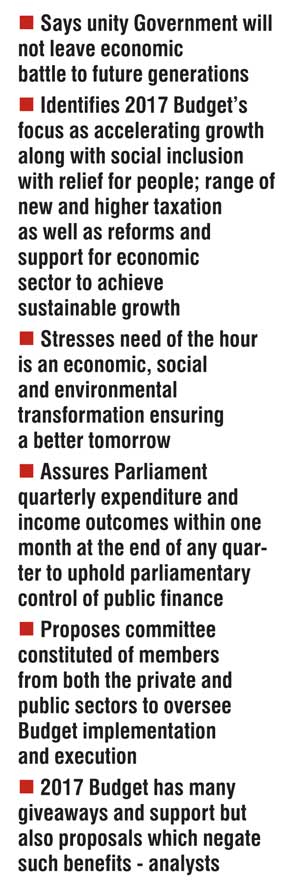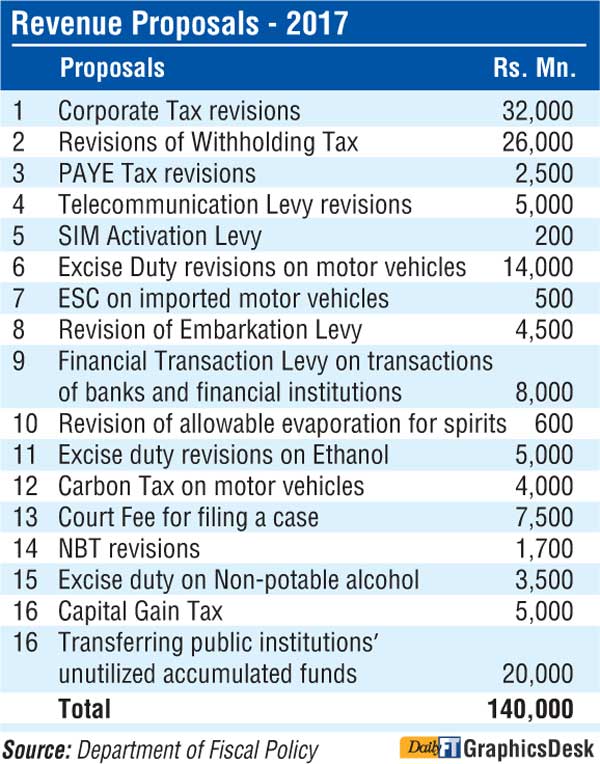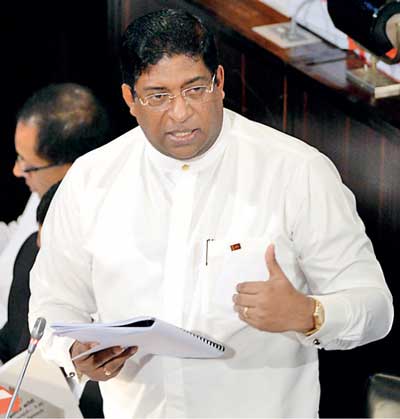Saturday Feb 21, 2026
Saturday Feb 21, 2026
Friday, 11 November 2016 00:01 - - {{hitsCtrl.values.hits}}
President Maithripala Sirisena and Prime Minister Ranil Wickremesinghe in conversation during the 2017 Budget presentation yesterday - See more
pix in 2017 Budget 16-page pullout
By the Daily FT News Desk
Finance Minister Ravi Karunanayake suggested that the purpose of the 2017 Budget, presented yesterday in Parliament, was to win  the “economic war” to accelerate growth and social inclusion.
the “economic war” to accelerate growth and social inclusion.
According to Karunanayake, the 2017 Budget, the second by the coalition government, offers “relief to the people but also pays the way for sustainable growth.”
As per a preliminary assessment, the 2017 Budget has endeavoured to please all sectors of the economy or most of it and all segments of society. There are many giveaways and support but also proposals which negate such benefits. The private sector’s initial response was “positive” or “good” but the 2017 Budget will come under further scrutiny today and over the weekend, which will result in a more accurate assessment.
Taking longer this year to present the Budget in Parliament, where President Maithripala Sirisena and Prime Minister Ranil Wickremesinghe were present, Karunanayake said: “The need of the hour is an economic, social and environmental transformation ensuring a better tomorrow for all Sri Lankans. A national development strategy to build a green and innovation-based economy through progressive reforms will ensure a better future for the children of the country and particularly for the educated younger generation.”
Before presenting far-reaching expenditure and revenue proposals, including new taxes and increases in major taxes, the Finance Minister assured the House the Government would formulate a cohesive policy to facilitate an equitable and inclusive level of social development in Sri Lanka.
“Accelerating growth with social inclusion forms the broader theme of the 2017 National Budget,” Karunanayake emphasised.
“To establish a strong economic foundation to achieve those goals and targets it will be difficult to traverse the chosen path but we will lay the foundation for a better future which forms the basis for the 2017 National Budget,” he added.
Karunanayake also sounded emotional when he revealed: “No Finance Minister wants to impose taxes and burden the people. Every Finance Minister wants to give concessions to the people improving their lives.”
Fighting to come out of debt trap
“However, our Government inherited the worst economic legacy that anyone could inherit. We are forced to fight a constant battle to relieve ourselves of this debt trap we are embroiled in,” Karunanayake said, reiterating the oft-repeated remark from the 2016 Budget presentation.
He acknowledged that the guidance he received from the President and Prime Minister in this regard was immeasurable. To support his reference to the economic battle, the Finance Minister recalled a quote from Field Marshall Sarath Fonseka, who was present in Parliament yesterday, saying: “I will not leave this war to the next Army Commander.”
Karunanayake said: “We also wish to assure this House and our fellow citizens that our Government will not leave this economic war to future generations.”
He went on to state that the 2017 Budget was prepared within the framework of commitments in the areas of health, education, information and communication technology, local government, women, women in political governance, corruption and the right to information. He asserted that the Government will continue to strengthen the governance framework and ensure that a truly open Government will be achieved.
The Parliament was told that the 2017 Budget was a departure from traditional budgets that focus only on welfare. “This Budget aims to create a sustainable environment which upholds the rights of our people, provides them with better infrastructure facilities, creates more opportunities for employment with better wages and above all enables all Sri Lankans to be empowered.”
Lessons learnt from 2016 Budget?
Given the widespread belief that many of 2016’s proposals were delayed or not implemented, successive fiscal roadmaps have  failed to be properly realised, Karunanayake admitted to Parliament that the Government was very conservative in projections of both revenue and expenditure.
failed to be properly realised, Karunanayake admitted to Parliament that the Government was very conservative in projections of both revenue and expenditure.
“We are also mindful that the external sector holds many uncertainties that could have a negative impact on the revenue estimates. In fact we will be presenting the quarterly expenditure and income outcomes to Parliament within one month at the end of any quarter because we will uphold the Parliamentary control of public finance. However, our Government is committed to a fiscal consolidation path and as such any possible revenue shortfalls will warrant us to realign the expenditure with the approval of this House,” the Finance Minister emphasised.
He also said that effective Budget implementation would be key in ensuring that “we meet the key economic growth targets we have set for ourselves.”
In this context he proposed to appoint a committee constituted of members from both the private and public sectors to oversee the Budget’s implementation and execution.
Karunanayake said that the coalition government had come a long way from the time it was mandated on 8 January last year, to usher in an era of good governance and prosperity for all.
 “Let me say this. All of us have differing opinions. We are entitled to them. That is the beauty of a democracy. But our ultimate responsibility is to our people, who voted for us. We have a choice of looking into the future or living in the past. But the danger of the latter is as Winston Churchill said, ‘If we open a quarrel between past and present, we shall find that we have lost the future’. I am sure that none of us here are willing to lose the future. Let’s work to ensure that we create a secure future for all our people and the generations to come,” said Finance Minister Karunanayake.
“Let me say this. All of us have differing opinions. We are entitled to them. That is the beauty of a democracy. But our ultimate responsibility is to our people, who voted for us. We have a choice of looking into the future or living in the past. But the danger of the latter is as Winston Churchill said, ‘If we open a quarrel between past and present, we shall find that we have lost the future’. I am sure that none of us here are willing to lose the future. Let’s work to ensure that we create a secure future for all our people and the generations to come,” said Finance Minister Karunanayake.